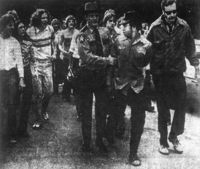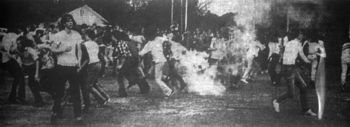Escambia High School riots
The Escambia High School riots were racially motivated nonviolent and violent demonstrations which occurred in varying forms between 1972 and 1977 at the then-newly desegregated Escambia High School. The centerpiece riot, which received the most publicity and was the most violent demonstration, occurred on February 5, 1976.
Background
Escambia High School, formerly an all-white school, was forcibly desegregated in 1969. In the fall of 1972, black students rioted at a home football game for their team, whose mascot was a "Rebel," modelled in appearance after the Colonel Reb of the University of Mississippi. The school band played the official school song, "Dixie," and it was from there that the violence ensued.[1]
Continuing until the end of the 1972–73 academic year, blacks and other students protested the mascot, school song and use of the Confederate Flag, which was flown at school events and games, on the grounds that the imagery the items brought up were insensitive to black people. On July 24, 1973, a United States District Court ruling deemed all of the aforementioned symbols as "racially irritating" and barred their use at the school level (Augustus v. School Board of Escambia County, 361 F. Supp. 383, 1973).[2] At the beginning of the next school year, the name "Raiders" was picked to be the new name for all of Escambia High's athletic teams.
Throughout 1974, the Escambia County School District appealed the decision, and on January 25, 1975, the United States Court of Appeals ruled in favor of the school board, overturning the injunction and decreeing that the school board should be in charge of the matter.[3]
Election and riot

On February 4, 1976, an impromptu school election was held in which students were allowed to vote to either keep the name as "Raiders" or change the name back to "Rebels." The students who preferred "Rebels" failed to secure a supermajority needed to win the ballot, and the next day, a riot ensued over four hours in the school day.[4] Four students were shot in the violence and twenty-six students were injured by rocks and debris while the calamity involved students smashing windows and trophy cases, as well as fighting with other students. It was estimated that three-quarters of the 2,523 students who attended Escambia High were involved in the riot.
In the days following the riot, attendance at the school dropped dramatically, especially among black students. There were reports of white students jeering at blacks on the nearly empty buses, and a white youth was found loitering near the school with a length of chain, but no incidents of violence occurred.
Aftermath
In the weeks that followeed, however, crosses were burned on many school board members' yards, with one member, who was black, specifically targeted with a gunshot which went through his window. A human relations board member as well as a state legislator also had their homes torched. After all the retaliatory violence both at the school and in the community, the Florida National Guard was called in to patrol the school until the end of the year.
In the fall of 1976, students chose the name "Gators" after a second ballot was deemed necessary. On July 26, 1977, the Ku Klux Klan held a rally on the school grounds with regards to the issue, which necessitated a reorganization of the school board. The name "Gators" has been used for Escambia High's athletic teams since, without incident.
References
- Mary Barrineau. "Escambia High Closed After 30 Hurt in Nickname Melee." Pensacola Journal, February 6, 1976.
- ↑ "State: A dubious demise." St. Petersburg Times, January 23, 2005.
- ↑ "Racial Animosity Turns to Violence in Pensacola, Fla., on Issue of Calling High School Teams 'Rebels.'" New York Times, March 7, 1976.
- ↑ Augustus v. School Board of Escambia County, 507 F.2d 152, 1975
- ↑ Richard Robbins. "The Belief Machine: The Metaphoric Construction of the World."
